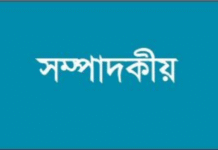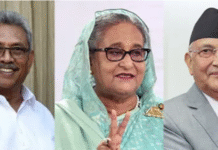Sadeq Khan
A new Act on citizenship of Bangladesh has been drafted by the government of Bangladesh and is now undergoing legislative and parliamentary scrutiny of the Ministry of Law and Parliamentary Affairs. The cabinet has meanwhile approved for legislation certain provisions expanding the scope of dual citizenship.
As the Cabinet Secretary told the press after the cabinet meeting last Tuesday: “The new law broadens the scope for dual citizenship. Until now, the law only allowed dual citizenship for Bangladeshis in the US and the UK. The new law is being formulated by merging ‘The Citizenship Act 1959’ and ‘The Bangladesh Citizenship Temporary Provisions Order 1972’. Those two laws have a lot of backdated issues. The new law addresses those matters.”
Conditions for citizenship
He said that anyone can renounce their Bangladeshi citizenship; but if one does so, the renouncement will also apply to one’s minor children. Foreign nationals, married to Bangladeshis, will have to reside in Bangladesh for at least five years to qualify for citizenship. So far, the period of residence has been four years.
The government may confer honorary citizenship on individuals for their contributions to Bangladesh: “In these instances, such citizens will not be able to participate in elections and cannot get involved with political parties. They cannot be employed for any State affairs, including as Supreme Court judges.”
The new law, however, specifies that Bangladeshis cannot go for dual citizenship with SAARC countries and Myanmar, and bars dual citizenship with countries the government has imposed a bar on by issuing gazettes and with those countries Bangladesh has no diplomatic relations. There is also bar on Supreme Court judges, MPs, members of the armed forces, public services and anyone holding a constitutional post against dual citizenship. They will not be permitted to possess dual citizenship.
The draft for the ‘Bangladesh Citizenship Act 2016’ also says that any Bangladeshi who pledges allegiance to a foreign state ‘directly or indirectly’ will lose their citizenship.
The new law includes a further provision for five years of imprisonment should one give false information to acquire citizenship.
Unlike under post-colonial governments of India and Pakistan, citizens of Bangladesh right from the time of foundation of the People’s Republic had enjoyed right to travel abroad almost unhindered by the state machinery. Citizens of all classes of people could obtain as a matter of civic right passports for foreign travel. This helped the country in the very difficult days of national reconstruction from war devastation. Many people, young and old, sought employment abroad, first as subjects of British Commonwealth and thereafter in other countries as economic migrants.
Details of citizenship
The wage-earners’ remittances provided floating hard currency needed to rebuild our industries and service sectors somewhat freely, like the garment industries and road transport vehicles, as a result of the wage-earner’s scheme.
The Bangladesh Citizenship (temporary provisions) order, 1972 (President’s Order No. 149 of 1972) provides interalia as follows: “Whereas it is expedient to make temporary provisions regarding citizenship of Bangladesh; Now, therefore, in pursuance of the Proclamation of Independence of Bangladesh, read with the Provisional Constitution of Bangladesh Order, 1972, and in exercise of all powers enabling him in that behalf, the President is pleased to make the following Order: “(Article) 2.
Notwithstanding anything contained in any other law, on the commencement of this Order, every person shall be deemed to be a citizen of Bangladesh- (i) who or whose father or grandfather was born in the territories now comprised in Bangladesh and who was a permanent resident of such territories on the 25th day of March, 1971, and continues to be so resident; or (ii) who was a permanent resident of the territories now comprised in Bangladesh on the 25th day of March, 1971, and continues to be so resident and is not otherwise disqualified for being a citizen by or under any law for the time being in force:
Provided that if any person is a permanent resident of the territories now comprised in Bangladesh or his dependent is, in the course of his employment or for the pursuit of his studies, residing in a country which was at war with, or engaged in military operations against Bangladesh and is being prevented from returning to Bangladesh, such person or his dependents, shall be deemed to continue to be resident in Bangladesh.
Provisions of new law
(Article)-2A: A person to whom Article 2 would have ordinarily applied but for his residence in the United Kingdom shall be deemed to continue to be permanent resident in Bangladesh within the meaning of that Article:
Provided that the Government may notify, in the official Gazette, any person or categories of persons to whom this Article shall not apply.
(Article) 2B.(1) Notwithstanding anything contained in Article 2 or in any other law for the time being in force, a person shall not, except as provided in clause (2), qualify himself to be a citizen of Bangladesh if he- (i) owes, affirms or acknowledges, expressly or by conduct, allegiance to a foreign state, or (ii) is notified under the proviso to Article 2A: Provided that a citizen of Bangladesh shall not, merely by reason of being a citizen or acquiring citizenship of a state specified in or under clause (2), cease to be a citizen of Bangladesh.
(2) The Government may grant citizenship of Bangladesh to any person who is a citizen of any state of Europe or North America or of any other state which the Government may, by notification in the official Gazette, specify in this behalf.
Current provisions for citizenship above, for all intents and purposes, may be said to be constitutional obligation a maxim of ‘friendship for all and enmity to none’ as its peace-seeking policy in foreign relations, in this age of globalisation there is no harm in further expansion of the scope of dual nationality in our Citizenship Act. But some reports in the vernacular media suggest that accompanying the new citizen, a new Bangladesh Passport Act 2016 is being finalised, which seeks to include provisions to limit “rights of regular citizenry more than the other proposal to expand scopes of dual citizenship of Bangladeshis.
Denial of civic rights
According to the reports, twelve categories of people are to be denied passport, and in effect denied civic rights. The general provision for denial of passports invokes a penal power of the state to refuse travel document to anyone against whom reasonable proof exists of involvement in lawlessness or anti-state activities. Passport would likewise be denied to anyone attempting to evade summons in a criminal court or evade criminal conviction, or anyone reported with reasonable proof to be involved in money-laundering, human trafficking, capital flight, drugs or arms smuggling, and of course if one is convicted under the Bangladesh Collaborators Order and the International Crimes (Tribunal) Act of 1973.
It is further stipulated in the draft of the Passport Act 2016, based on an earlier draft of Bangladesh Passport Act 2013 that on the basis of intelligence report, if the Immigration and Passport authorities are satisfied that there is an administrative ban on foreign travel of any person, or if there is reasonable doubt that the applicant for passport may indulge in activity abroad against the sovereignty, security and integrity of the nation-state, he or she would be refused passport by the state. If an applicant is in a foreign country and reported to be involved in activity likely to adversely affect the relation of Bangladesh with that country or any other country, he or she would be denied passport, as would be to any person found in police report to be involved with any international terrorist organisation or international criminal outfit. Criminal courts would be authorised to withdraw or confiscate passports of offenders as part of penalty or conviction for certain offences. Passports could also be liable to be withdrawn or confiscated by executive order on five other counts of cause for travel restriction, violation of terms of passport, for travel restriction, violation of terms of passport or possession of altered/forged passport, the last count calling for criminal prosecution.
A mortal blow
If enacted, such a law would certainly be a mortal blow to the already mutilated democratic order of our nation-state, and a violation of the basic principles of our much-abused Constitution. It would be far worse than the restricted civil liberty allowed by the two post-colonial states of British India, both of which invoked “special powers” to deal with supposed anti-state (which often meant antigovernment) elements. All political parties of Bangladesh and erstwhile East Pakistan abhorred special powers of the executive, and rejected it the Special Powers Act.
It is a pity, though, that successive governments in Bangladesh in practice exercised by misfeasance of police powers most of the counts of denial or confiscation of passport or restriction of travel of suspects without proper process of law. Excessive police powers accrued under successive governments and political abuse of the same particularly under the current regime has already repressed illiberal democratic order of this country to a choking point. The de-facto repressive and restrictive practices of the executive in the name of security of the state is now sought to be given legal cover. It would make the perception of a de-facto police-state situation of this country into a de jure police-state indeed.
Source: Weekly Holiday









